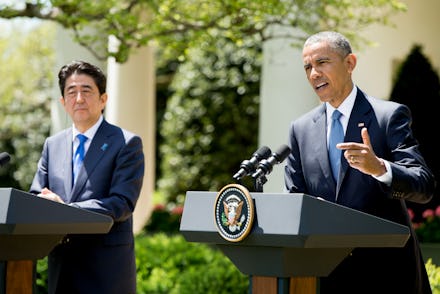"This Is Not New": President Obama Speaks Out on Police Violence and Baltimore Riots

With the National Guard posted in Baltimore, President Barack Obama challenged community leaders, clergy, local government and federal lawmakers on Tuesday to come together and address the "slow-rolling crisis" of police violence against "primarily African-American, often poor" citizens.
With Japanese Prime Minister Shinzo Abe standing next to him in the Rose Garden at the White House, Obama spoke uninterrupted for 14 minutes about the situation in Baltimore, reserving especially harsh words for the groups and individuals responsible for the riots and looting of West Baltimore storefronts and businesses.
What he said: Obama denounced the "handful of criminals and thugs who tore up" parts of the city during a series of violent outbursts on Monday following the funeral of Freddie Gray, the 25-year-old black man who died April 19 after suffering grave injuries in police custody a week earlier. The parallel investigations into his death — one by the city and another by Justice Department officials — have yet to return a clear understanding of the circumstances leading to Gray's death.
"That is not a protest," Obama said. "That is not a statement. It's people — a handful of people taking advantage of a situation for their own purposes, and they need to be treated as criminals." Hundreds of people were arrested on Monday, officials told CNN, as 19 structure fires burned and more than 140 vehicles went up in flames across West Baltimore.
But Obama quickly moved beyond the particulars of this latest round of unrest to spell out his more deeply held concerns:
"Since Ferguson, [Missouri,] and the task force [on police tactics] that we put together, we have seen too many instances of what appears to be police officers interacting with individuals — primarily African-American, often poor — in ways that have raised troubling questions. And it comes up, it seems like, once a week now, or once every couple of weeks. And so I think it's pretty understandable why the leaders of civil rights organizations but, more importantly, moms and dads across the country, might start saying this is a crisis. What I'd say is this has been a slow-rolling crisis. This has been going on for a long time."
"This is not new," the president said — a phrase he would repeat during his lengthy response. "And we shouldn't pretend that it's new."
Obama also pointed the finger at Capitol Hill, accusing congressional Republicans of lacking the desire, much less the political will, to coalesce around meaningful reforms to municipal governments and their police forces:
"If we are serious about solving this problem, then we're going to not only have to help the police, we're going to have to think about what can we do — the rest of us — to make sure that we're providing early education to these kids; to make sure that we're reforming our criminal justice system so it's not just a pipeline from schools to prisons; so that we're not rendering men in these communities unemployable because of a felony record for a nonviolent drug offense; that we're making investments so that they can get the training they need to find jobs. That's hard. That requires more than just the occasional news report or task force. And there's a bunch of my agenda that would make a difference right now in that.
Obama has been reticent to dive into these roiling debates over police violence and race. When he has, critics on both sides of the aisle have been quick to challenge his allegiances or question his motivation.
But on Tuesday, Obama turned his Rose Garden podium into a bully pulpit and, with a certain freedom in his voice, spoke what sounded like his truth — intolerance for disorder, mixed with real anger about slow-moving or stalled reforms and a spark of hope that "newfound awareness because of social media and video cameras" could be the impetus for more substantial action, from city streets to city hall and Washington, D.C.